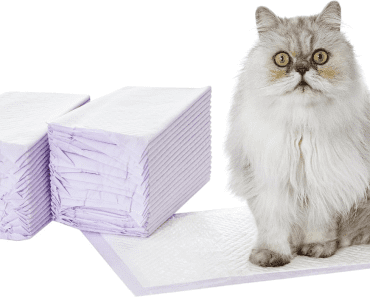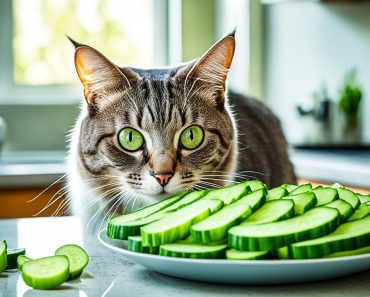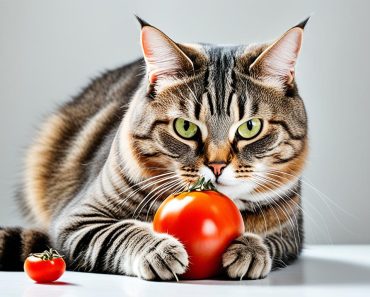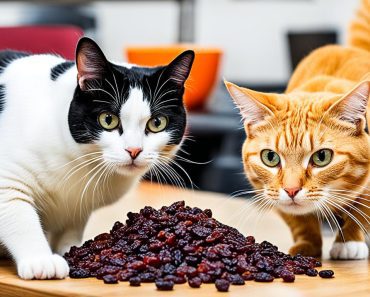As a cat owner, it’s crucial to be well-informed about the foods that are safe and healthy for our feline friends. While cats have specific dietary needs, there are certain foods that can pose a risk to their health. One such food is grapes. So, can cats eat grapes?
When it comes to grapes and cats, it’s essential to understand the potential dangers associated with their consumption. While some cats may show no adverse effects after eating grapes, approximately 15% of dogs and cats can experience toxicity symptoms. This makes it vital for us to take the necessary precautions to ensure that our cats stay safe and healthy.
Grape toxicity in cats is relatively uncommon compared to other toxic foods, but it has been documented. Although the exact toxin is yet to be identified, it is believed to be a water-soluble compound present in the flesh of grapes. Cats who consume grapes can exhibit symptoms such as restlessness, reduced appetite, and vomiting.
While cases of kidney damage in cats from grape ingestion are rare, they can still occur. It’s important to note that the amount of grapes or raisins that can cause harm to a cat can vary. The lowest known toxic threshold is about 0.7 oz per 2.2 pounds of the cat’s weight for grapes. This means that even a small number of grapes can potentially be dangerous to our furry friends.
If your cat has consumed grapes, it’s crucial to take immediate action. Contacting your veterinarian is essential, as they can provide expert advice on whether any home care is needed. They may also recommend reaching out to poison control for further guidance. In some cases, inducing vomiting may be necessary, but this should only be done under the supervision of a veterinary professional.
The initial signs of grape poisoning in cats may include gastrointestinal symptoms such as vomiting and diarrhea within the first 12-24 hours. Over the next 24-48 hours, more severe signs of kidney disease may develop, including increased thirst, lethargy, and potentially kidney failure. It is crucial to seek veterinary care promptly if you observe these symptoms in your cat after they have consumed grapes.
In conclusion, while it is relatively uncommon for cats to eat grapes, it is crucial to be aware of the potential risks involved. To keep our feline friends safe, it’s best to keep grapes and raisins out of their reach altogether. By providing a balanced and appropriate feline diet, we can ensure that our beloved cats stay healthy and happy for years to come.
Can Cats Eat Grapes? Yes, in small amounts, but it is not recommended.
- Grapes can be toxic to cats, with approximately 15% experiencing toxicity symptoms.
- Cats can show symptoms such as restlessness, reduced appetite, and vomiting after consuming grapes.
- The lowest known toxic threshold for cats is about 0.7 oz per 2.2 pounds of the cat’s weight for grapes.
- If your cat eats grapes, contact your veterinarian for advice and consider inducing vomiting under their guidance.
- Signs of grape poisoning in cats can include gastrointestinal symptoms and potential kidney failure.
Are Grapes Bad for Cats?
Grape toxicity is uncommon in cats, but it has been documented. While the exact toxin has not yet been identified, it is believed to be a water-soluble compound in the flesh of the grape. Cats can experience symptoms such as restlessness, reduced appetite, and vomiting after consuming grapes. While kidney damage in cats from grapes is rare, it can occur. It is important to take grape ingestion in cats seriously and seek veterinary care if your cat has consumed grapes.
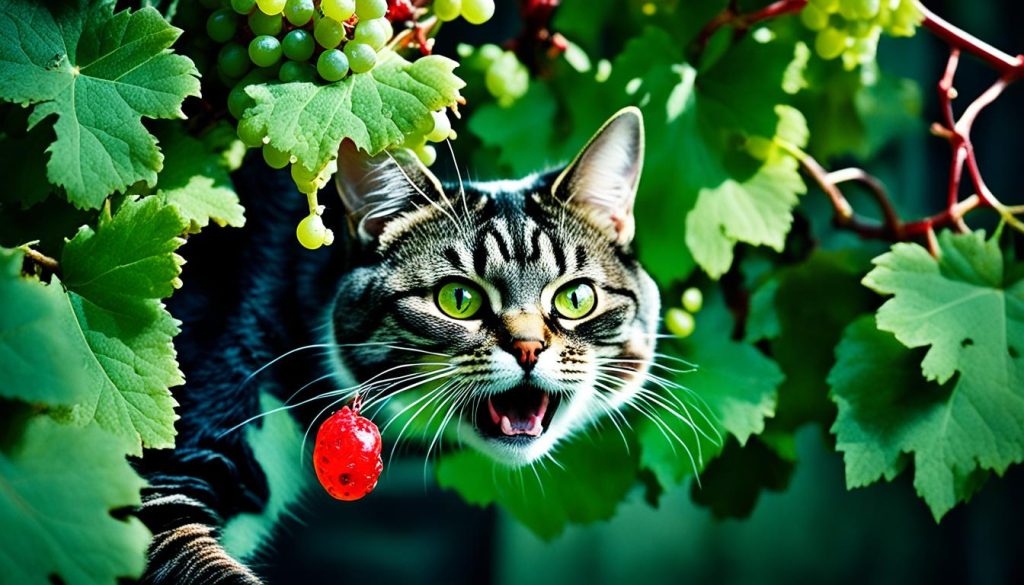
Can One Grape Hurt a Cat?
When it comes to grapes and cats, even a small amount can potentially harm your feline friend. The toxic threshold of grapes for cats is surprisingly low, with the lowest known amount being 0.7 oz per 2.2 pounds of the cat’s weight. This means that just one grape can pose a risk to your cat’s health if they consume more than the safe threshold.
Grape toxicity in cats can lead to kidney damage, a serious condition that requires immediate veterinary care. It’s best to keep grapes and raisins out of your cat’s reach to avoid any potential risks. Remember, prevention is key when it comes to protecting your cat’s well-being.
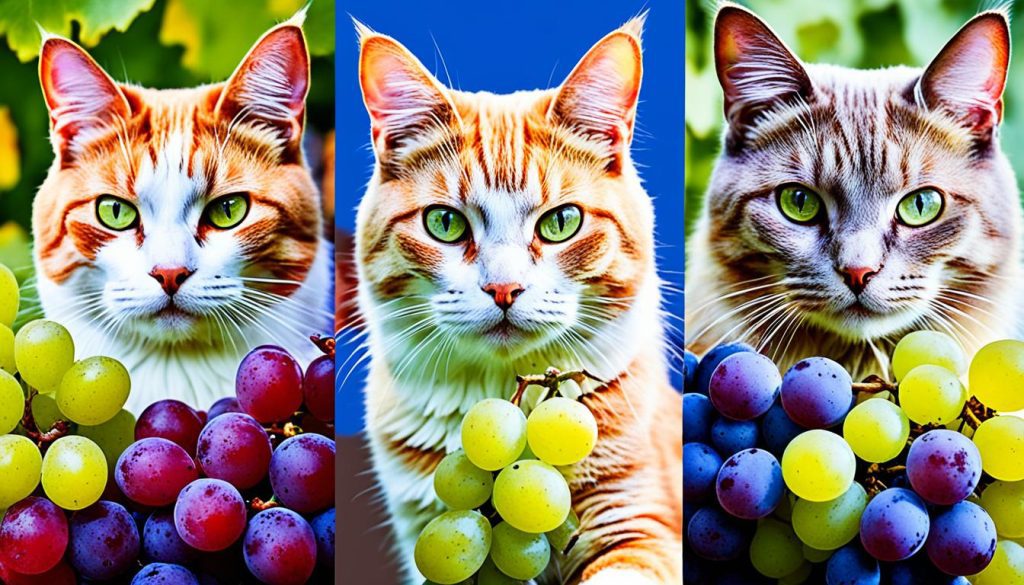
What To Do if Your Cat Has Eaten Grapes
If your cat has consumed grapes, it’s important to take immediate action. Contact your veterinarian right away for advice, as they can provide guidance on whether any home care is needed and may recommend contacting poison control. In some cases, inducing vomiting may be recommended, but this should only be done under the guidance of a veterinarian. Treatment for grape toxicity in cats may involve decontamination of the digestive tract, IV fluids to protect the kidneys, and monitoring for any signs of kidney damage.
If you find yourself in a situation where your cat has eaten grapes, don’t panic. Remain calm and take the following steps to ensure the safety of your feline friend:
- Contact your veterinarian: Give them a call immediately to explain the situation. They will be able to provide guidance based on your cat’s specific circumstances.
- Follow their advice: Your veterinarian may ask you to monitor your cat at home or recommend bringing them in for an examination. It’s important to follow their instructions carefully.
- Don’t induce vomiting without professional guidance: While inducing vomiting may be appropriate in some cases of grape ingestion, it should only be done under the guidance of a veterinarian. They will be able to assess whether this is necessary and provide proper instructions.
- Transport your cat safely: If your veterinarian advises bringing your cat in for evaluation, ensure they are securely and comfortably transported in a carrier. This will help prevent any additional stress or injuries during the journey.
- Allow the veterinary team to take over: Once you arrive at the clinic, the veterinary team will assess your cat’s condition, administer any necessary treatments, and closely monitor their kidney function. Follow their recommendations for follow-up care and home monitoring.
Remember, time is of the essence when it comes to grape toxicity in cats. Acting quickly and seeking professional advice is crucial for the well-being of your furry companion. Stay vigilant and take steps to prevent your cat from accessing grapes in the future.
Signs of Grape Poisoning in Cats
When it comes to grape poisoning in cats, recognizing the signs early is crucial. If your cat has ingested grapes, here are some symptoms to watch out for:
Gastrointestinal Symptoms:
- Vomiting
- Diarrhea
These symptoms may start within the first 12-24 hours after grape consumption. If you notice your cat experiencing these gastrointestinal issues, it could be an indication of grape toxicity.
Severe Kidney Disease Symptoms:
- Increased thirst
- Lethargy
- Potential kidney failure
Over the next 24-48 hours, more severe signs of kidney disease may develop. If your cat shows increased thirst, appears lethargic, or displays signs of potential kidney failure, it’s vital to seek prompt veterinary care.
Remember, the consumption of grapes can cause kidney damage in cats, and timely intervention is essential to prevent further complications.
Conclusion
While it is uncommon for cats to eat grapes, it is crucial to be aware of the potential risks associated with grape consumption. Grape toxicity can lead to kidney damage in cats, making prompt veterinary care essential if your cat consumes grapes.
To ensure the well-being of your feline friend, it is best to err on the side of caution and avoid feeding grapes to cats altogether. By keeping grapes out of their reach and providing a safe and suitable diet, you can protect your cat’s health and avoid any potential complications.
Remember, even a small amount of grapes can be harmful to cats, and the toxic threshold can vary. If you suspect that your cat has ingested grapes or shows any signs of grape poisoning, such as vomiting or increased thirst, seek immediate veterinary attention.
By prioritizing your cat’s safety and being mindful of the foods they consume, you can help ensure a healthy and happy life for your feline companion.

